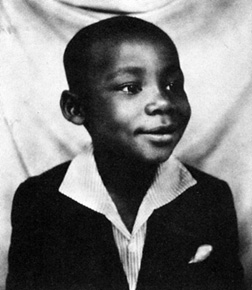In commemoration of Martin Luther King Jr. Day, UNMC Today will feature a series of photos and quotations from the civil rights leader. In today’s excerpt, King recalls when he first became aware of racial prejudice.
The series will culminate Jan. 20 at noon with a presentation by Diane Ariza, Ph.D., assistant dean of multicultural affairs at Albion College in Albion, Mich., and former director of multicultural affairs at the University of Nebraska at Omaha. Free pizza and soda will be available for the first 300 guests at the Storz Pavilion. A live videotape presentation of Dr. Ariza’s presentation will be available for overflow audience members at the Wittson Hall Amphitheater. A sign language interpreter will be present to translate for audience members who are deaf or hearing impaired.
 |
Martin Luther King Jr. at age 6. |
Playboy: As one who grew up in the economically comfortable, socially insulated environment of middle-income home in Atlanta, can you recall when it was that you yourself first became painfully and personally aware of racial prejudice?
Dr. King: Very clearly. When I was fourteen, I had traveled from Atlanta to Dublin, Georgia with a dear teacher of mine, Mrs. Bradley; she’s dead now. I had participated there in an oratorical contest sponsored by the Negro Elks. It turned out to be a memorable day, for I had succeeded in winning the contest. My subject, I recall, ironically enough, was “The Negro and the Constitution.” Anyway, that night, Mrs. Bradley and I were on a bus returning to Atlanta, and at a small town along the way, some white passengers boarded the bus and the white driver ordered us to get up and give the whites our seats. We didn’t move quickly enough to suit him, so he began cursing us, calling us “black sons of –.” I intended to stay right in that seat, but Mrs. Bradley finally urged me up, saying that we had to obey the law. And so we stood in the aisle for the ninety miles to Atlanta. That night will never leave my memory. It was the angriest I have ever been in my life.”
Excerpt from Playboy magazine interview with Martin Luther King, Jr. in January, 1965. Taken from A Testament of Hope: The Essential Writings of Martin Luther King, Jr., edited by James Melvin Washington (Harper & Row Publishers, 1986).
Photo from The Papers of Martin Luther King Vol. 1: Called to Serve, edited by Clayborne Carson, University of California Press, 1992.